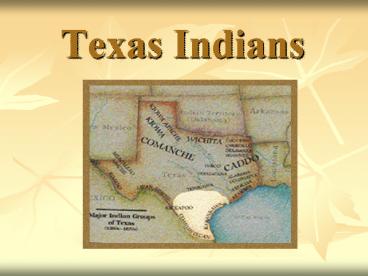Texas Indians - PowerPoint PPT Presentation
1 / 24
Title:
Texas Indians
Description:
Apaches were organized into bands that traveled, hunted and fought together. The Apaches were skilled horsemen and often teamed up when hunting buffalo. – PowerPoint PPT presentation
Number of Views:117
Avg rating:3.0/5.0
Title: Texas Indians
1
Texas Indians
2
Western Gulf Culture
3
Karankawa
- Karankawa were hunters and gatherers who lived
in the area of Galveston to Corpus Christi. They
were nomads. They used dug-out canoes to fish,
hunt sea turtles and collect shells. They also
hunted deer and small animals. They lived in
wigwams.
4
Karankawa
The Karankawa did not need much clothing. Their
clothes were made out of deerskin or grass. They
painted themselves with bright colors. To keep
the insects away they rubbed alligator fat and
dirt into their skin..
5
Karankawa
- The Karankawa treated their children with
kindness. They gave their children two names, one
that was only known to the family.
6
Coahuiltecan
- The Coahuiltecan hunted and gathered food in
south Texas. They were nomadic and covered large
distances following buffalo, deer and small
animals.
7
Coahuiltecans
- Coahuiltecans also fished and hunted for wild
plants. Their diets included ants, eggs, lizards,
snakes, spiders and worms.
8
Coahuiltecan
- They did not build permanent homes.
- Both men and women wore their hair long. They
worked hard but also enjoyed feasting and
dancing.
Wikiup Hut
9
The Southeastern Culture Area
10
Caddo
- The Caddo moved into Eastern Texas from
Arkansas, Louisiana and Oklahoma. They organized
their tribes into three confederacies They built
permanent villages and became expert farmers.
11
Caddo
- The Caddo grew beans, corn, squash, sunflower
seeds and tobacco. When farming, they practiced
crop rotation.
12
Caddo
The Caddo was a matrilineal society. This means
they traced their families through their mothers
side. Both men and women tattooed and painted
their bodies.
13
- Their houses were wooden poles covered with
grass. Some may have plastered the outside walls
with mud.
14
Wichita
The Wichita settled along the Red River. They
grew beans, corn, melons and squash and used
horses to hunt buffalo and deer. They lived in
permanent villages. The Wichita tattooed their
bodies, but theirs was more extreme than the
Caddo.
15
Atakapa
- Along Gulf of Mexico lived the Atakapa Indians.
The Atakapa Indians didn't do much farming.
Instead, they made their livelihood as hunters
and fishermen. Most of their diet was fish and
seafood (including oysters, shrimp, and crabs.)
Atakapa men also hunted big game like deer,
buffalo, and alligators, and women gathered
fruit, nuts, and wild honey.
16
Atakapa
- Atakapa people lived in brush shelters, which
were small huts made of grass and reeds built
around a simple wooden framework. These brush
houses were not large or fancy, but they were
easy to build and move from place to place, so
they fit the Atakapa lifestyle
17
The Pueblo Culture Area
18
The Puebloan Jumanos
- The Jumano lived along the Rio Grande River. They
are called Puebloan because the houses and
buildings they lived in are called Pueblos. A
Pueblo is like a big apartment building. Most
have two or more stories. The walls are usually
made from large mud bricks called adobe bricks.
If the right kind of rock is available, many
Pueblos would build rock walls. The rooms are
small by our modern standards. A whole family
would live in one room. All the people in a
Pueblo are like one big family.
19
The Plains Culture Area
- The Great Plains stretches from Canada into
Southern Texas. Many Native American groups lived
along the edges of the Plains to farm and hunt
buffalo. When the Spanish arrived, horses were
introduced to the Indian tribes. Many Plains
Indians became excellent horsemen. Most lived in
tepees.
20
The Tonkawa
- The north-central plains and the southeastern
edge of the Edwards Plateau was home to the
Tonkawa. The buffalo was the source for food,
clothing and shelter for these hunters-gatherers.
The Tonkawa were driven from their hunting
grounds by the Apache.
21
The Apache
- The Apache culture originated in Canada and
migrated to the Great Plains. Two Apache groups,
the Lipan and Mescalero, settled in Texas.
Apaches were organized into bands that traveled,
hunted and fought together. The Apaches were
skilled horsemen and often teamed up when hunting
buffalo. Lipan Apaches were also farmers which
was very unusual for Apaches.
22
Apaches
- Most Apache men cut their hair very short on
the left side but allowed the hair on the right
to hang long. They tied feathers and other
decorations to their hair. The men had no facial
hair and the women wore earrings. Apaches were
feared throughout Texas.
23
Comanche
- The Comanche originally lived in the western
part of the United States. They eventually moved
into the Great Plains once they acquired horses.
The Comanche lived in bands headed by a peace
chief. If you were the best fighter and rider you
were the war chief. The Comanche were skilled
buffalo hunters. Because of the their skills they
soon controlled much of the plains including west
and northern Texas.
24
Kiowa
- The Kiowa were the last plains group to
arrive in Texas. They hunted buffalo, and
gathered berries, fruits and nuts. They traded
with other groups for what they did not have. The
hair of the Kiowa men was long but over the right
ear it was short. The Kiowa and the Comanche were
allies.































